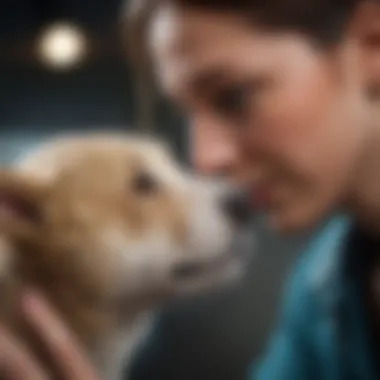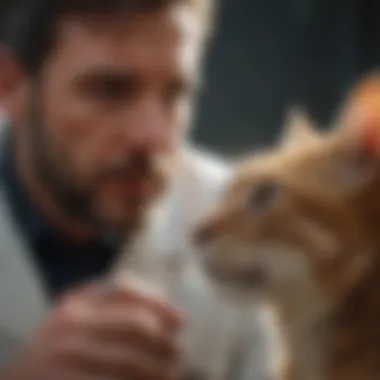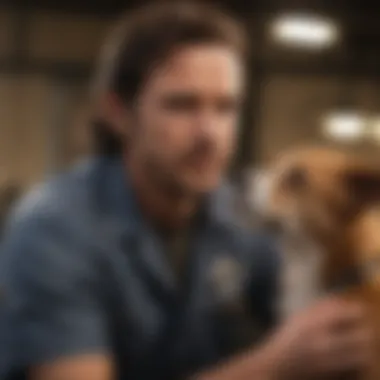Exploring the Impact of Animal Planet Vet Shows


Intro
Animal Planet’s veterinary-themed shows have gained a significant place in popular culture. These programs enlighten the audience about various aspects of animal care and the veterinary profession. They bridge the gap between veterinarians and the general public, highlighting the importance of responsible pet ownership and animal welfare. The shows captivate viewers with their real-life stories, emphasizing compassion and knowledge in treating animals.
This article provides a thorough analysis of these shows, examining their educational value and impact on animal welfare awareness. Moreover, it explores specific programs and the veterinarians featured, contributing to the evolving narrative surrounding veterinary practices. Through this exploration, the article aims to deepen the understanding of animal care and conservation efforts.
Animal Overview
Veterinary shows on Animal Planet showcase a wide variety of animal species. Each episode usually features common pets like dogs and cats, exotic animals like birds and reptiles, and occasionally larger wildlife.
Common Names
Among the popular species represented in these shows are:
- Dogs
- Cats
- Rabbits
- Ferrets
- Iguanas
- Macaws
Scientific Classification
These animals belong to various taxonomical categories. For example:
- Domestic Dog: Canis lupus familiaris
- Domestic Cat: Felis catus
- Common Rabbit: Oryctolagus cuniculus
Geographic Range
The species featured can be found in diverse habitats across the globe. Domestic dogs and cats are prevalent in urban areas worldwide, while exotic animals may come from specific regions. For instance, macaws are native to Central and South America, whereas iguanas are primarily found in tropical areas.
Educational Value
Veterinary shows serve a critical educational role. They provide insights into animal behavior, health issues, and the significance of veterinary care. Viewers can learn about:
- Common pet health problems
- Preventative measures in animal care
- Procedures involved in veterinary practices
“Veterinary shows can spark interest in animal welfare and ignite a sense of responsibility among viewers.”
The portrayal of veterinarians also plays a crucial role in changing public perception, demonstrating their expertise and compassion.
Impact on Animal Welfare Awareness
Animal Planet's shows have a measurable impact on public attitudes towards animal welfare. Viewers often become more informed about:
- Adoption rates and responsible pet ownership
- Understanding animal needs and behavior
- Issues surrounding animal cruelty and neglect
By presenting these topics, the shows contribute to a more educated audience that is likely to advocate for better animal care practices.
Portrait of Veterinary Practices
These veterinary shows often depict a range of practices, from emergency surgeries to routine check-ups. They also highlight the emotional aspects of veterinary work. The challenges veterinarians face are addressed candidly, demonstrating their dedication and the complexities of animal care.
The portrayal of real-life scenarios helps demystify veterinary practices for the public and encourages empathy towards both animals and their caregivers.
Epilogue
In summary, Animal Planet's veterinary-themed shows are not just entertainment. They are a vital source of education and awareness regarding animal care and welfare. These programs foster an understanding of the veterinary profession and improve public perception of animal treatment. The ongoing evolution of narratives within these shows reflects changing attitudes towards animal care and conservation.
In the end, the influence of these shows stretches beyond the screen, inspiring a community that values animal well-being and protective practices.
Intro to Animal Planet Vet Shows


Understanding Animal Planet's veterinary-themed programming is essential for anyone interested in animal care and the veterinary profession. These shows not only provide entertainment but also serve as a significant educational platform. By showcasing real-life veterinary practices, they allow viewers to gain insight into the complexities and challenges faced by veterinarians.
Overview of Animal Planet
Founded as a channel dedicated to showcasing the lives of animals and their habitats, Animal Planet has evolved to include a focus on veterinary care. It became a hub for audiences fascinated by the animal kingdom. This evolution in programming allowed for a broader discussion on the importance of animal welfare and the role veterinarians play in society.
By featuring various shows, Animal Planet has successfully harnessed the power of media to raise awareness about animal health issues and veterinary medicine. This is significant because it encourages viewers to think critically about the responsibilities that come with pet ownership and fosters a sense of empathy towards animals in need.
Emergence of Veterinary Shows
The rise of veterinary shows on Animal Planet reflects a growing public interest in the health and treatment of animals. These shows, starting in the early 2000s, brought veterinary stories into living rooms across America and beyond. Initially, these programs focused on the everyday operations of veterinary practices, offering a glimpse behind the clinic doors.
With the popularity of series like
Educational Value of Veterinary Television
The educational value of veterinary television, especially on platforms like Animal Planet, is significant and multifaceted. These shows do not merely entertain; they impart essential knowledge about animal health and welfare. By bringing veterinary practices into homes, they foster an understanding of how to care for pets and the challenges faced in veterinary medicine. The importance of this educational aspect cannot be overstated, as it shapes public perception and can lead to more conscientious pet ownership.
Informing the Public on Animal Health
Animal Planet vet shows serve as vital resources for informing the public about animal health issues. They cover a broad range of topics, such as common diseases, preventive care, and the importance of regular veterinary check-ups. One notable example is Dr. Jeff: Rocky Mountain Vet, which presents real-life cases that emphasize the significance of timely medical intervention. Viewers learn not only about the symptoms of certain ailments but also about the treatments available and the costs associated with them.
Moreover, these shows often highlight the emotional bond between animals and their owners. This connection can make people more aware of their pets' needs. For instance, segments showing pets receiving vaccinations or undergoing surgery can often encourage viewers to ensure their own animals receive necessary medical attention.
Additionally, the dissemination of accurate veterinary information helps debunk myths that might otherwise lead to neglect or insufficient care. As the program advances, the audience gains a clearer picture of what constitutes responsible pet ownership, ultimately benefitting the animals involved.
Demystifying Veterinary Practices
Animal Planet’s vet shows also play a crucial role in demystifying the veterinary profession. Many people often view veterinarians as distant figures, cloaked in mystery surrounding their practices and medical decisions. By showcasing the daily lives of veterinarians and the intricate procedures they perform, these shows make the profession more accessible and relatable.
For example, The Supervet, featuring Noel Fitzpatrick, introduces viewers to advanced surgical techniques while explaining them in layman's terms. This can help normalize discussions about veterinary medicine. Understanding procedures like orthopedic surgeries or dental cleanings might reduce apprehension, thus prompting pet owners to seek help rather than hesitate due to fear or misunderstanding.
Education through visual storytelling helps bridge the gap between professionals and pet owners. This approach builds trust and fosters confidence in veterinary decisions. It reminds viewers that professional guidance is not only crucial but also attainable, fostering a culture of care that extends beyond the screen.
“Veterinary television impacts public perception by providing knowledge that empowers responsible pet ownership and enhances animal welfare.”
In summary, the educational aspects of veterinary television are profound. They inform, clarify, and demystify the field of veterinary medicine while engaging a diverse audience. The on-screen experiences provide valuable insights that can lead to more informed decision-making for animal care.
Impact on Animal Welfare Awareness
The role of veterinary shows on Animal Planet extends beyond entertainment; they serve as a catalyst for raising awareness about animal welfare. As audiences engage with the stories of animal rescue and rehabilitation, they become more cognizant of the issues facing abandoned and abused animals. This awareness is vital for fostering a culture of empathy towards all living beings. Veterinary programming conveys powerful messages about the importance of responsible pet ownership and the impact of neglect on animals. It helps to bridge the gap between theoretical knowledge of animal care and real-world application.
Promoting Animal Rescue and Adoption
Animal Planet’s vet shows often highlight the inspiring work of rescue organizations, showcasing the journey of animals from abandonment to adoption. Viewers see the transformative power of love and care through visual narratives. Such representation encourages more individuals to consider adopting pets rather than buying from breeders. The shows educate audiences about local shelters and the diverse animals awaiting homes. This promotes a culture where adoption becomes the preferred option.
Additionally, by telling stories of animals in need, the shows touch on the emotions of the audience, creating a sense of urgency and responsibility. Viewers witness the before-and-after of animal rescue, which effectively humanizes these furry companions. A well-placed narrative often leads to increased volunteer activity and donations towards animal welfare organizations.
“Rescue stories can be a profound source of hope. They remind us that every life matters and that compassion can lead to real change.”
Highlighting Veterinary Ethics
Beyond rescuing animals, Animal Planet's programming often dives into the ethical considerations associated with veterinary practice. It presents the dilemmas veterinarians face, including end-of-life decisions, treatment options, and the importance of humane care. These situations compel viewers to think critically about their own beliefs regarding animal care and ethics.
Veterinarians featured in these shows become role models for aspiring veterinary students and animal lovers alike. They embody dedication, compassion, and skill. Their decision-making processes are portrayed with candor, providing insight into the responsibilities veterinarians bear. This transparency helps cultivate a deeper understanding of the complexities within the veterinary field.
The conversations surrounding veterinary ethics in media also serve to challenge public perceptions. Issues such as overpopulation, spaying and neutering, and the role of veterinarians in maintaining animal health are brought to the forefront. By addressing these topics, vet shows contribute to a more informed audience that can engage in discussions regarding best practices in animal care.


In essence, the impact of Animal Planet vet shows on animal welfare awareness is multifaceted. They promote fostering a culture of adoption, develop more nuanced views about veterinary ethics, and encourage responsible animal stewardship among the public.
Notable Animal Planet Vet Shows
The examination of notable Animal Planet veterinary shows sheds light on several aspects of veterinary practice, animal welfare, and public perception. These shows serve not only as entertainment but also as vital educational tools that emphasize the importance of animal care. In a world where many are disconnected from animals’ lives, these shows can bridge that gap, providing a platform for educating the audience on various veterinary topics. They highlight the compassion, dedication, and skill involved in veterinary work, making the profession more visible and relatable to viewers.
Animal Cops
Animal Cops is a series that vividly illustrates the intersection of law enforcement and animal welfare. This show follows animal control officers and veterinarians as they rescue distressed and abused animals. The combination of rescue efforts and rehabilitation provides viewers with a stark look at the realities of animal abuse and neglect. Each episode not only emphasizes the urgency of animal welfare but also offers insights into the legal and ethical considerations involved in saving lives.
The focus on both rescues and the legal process behind them makes this show particularly impactful. Viewers often gain a deeper understanding of the challenges faced by veterinarians and animal advocates. By highlighting both success stories and the harsh realities of the work, Animal Cops encourages a more profound appreciation for the efforts necessary to combat animal cruelty and promote welfare practices.
Dr.
Jeff: Rocky Mountain Vet
Dr. Jeff: Rocky Mountain Vet features Dr. Jeff Young, a highly skilled veterinarian operating in Colorado. This show focuses on his team as they care for animals in a multi-faceted practice, which often includes rescue cases. The nuances of veterinary skill, along with the emotional bonds formed with pet owners, are central themes throughout the episodes.
The appeal of Dr. Jeff: Rocky Mountain Vet lies in its authenticity and relatability. Viewers are drawn in by the personal stories of the pet owners and their animals. Dr. Young’s compassion and expertise shine, opening up discussions on the complexities of pet care, including financial constraints and emotional bonds with pets. Thus, this show not only entertains but enlightens audiences about the commitment required in animal care.
The Supervet
The Supervet presents a distinctive model of veterinary care through the lens of renowned veterinary surgeon Noel Fitzpatrick. He showcases advanced surgical techniques and innovative treatments. This show has carved out a niche by emphasizing cutting-edge veterinary medicine. The willingness to take on difficult cases captivates viewers and fosters a sense of hope, even in dire situations.
Through this program, audiences witness the highs and lows of veterinary care, as well as the joy experienced when animals overcome challenges. The Supervet serves as a testament not just to the technical skills of the veterinary profession but also to the emotional resilience involved in animal care. The innovation in treatment methods discussed in this show provides a rich source of information for anyone interested in veterinary science.
By watching these shows, audiences can improve their understanding of the veterinary profession and the ethical considerations surrounding animal care.
In summary, these notable Animal Planet vet shows play a crucial role in shaping perceptions regarding veterinary practices. They bring attention to the challenges faced by veterinarians, while also underlining the necessity for compassion and ethical considerations in animal care.
Veterinary Personalities and Their Influence
Veterinary personalities serve a crucial role in shaping public perceptions of animal care. These professionals not only diagnose and treat animals but also educate the audience about important veterinary practices. Their passion and expertise resonate with viewers, cultivating a relationship between the public and the veterinary profession. This connection fosters a better understanding of animal welfare and promotes responsible pet ownership.
In the context of Animal Planet's programming, personalities such as Dr. Jeff Young and Professor Noel Fitzpatrick bring real-life veterinary challenges into living rooms. Their work highlights the emotional and ethical aspects of veterinary care. In addition, these personalities can influence young aspiring veterinarians, showing them the impact they can have through their careers.
Impactful veterinarians often become relatable figures. Their on-screen presence humanizes the clinical aspect of veterinary medicine, making the profession more approachable. They provide a face to the realities of animal treatment, revealing both the joys and hardships of the profession. The portrayal of these veterinarians plays a vital role in dispelling myths and addressing misconceptions surrounding animal care.
Profiles of Prominent Veterinarians
Profiles of veterinarians featured in Animal Planet shows emphasize their credentials, experiences, and unique approaches to animal care. Dr. Jeff Young is well known for his engaging personality and focus on community veterinary services. His show, Dr. Jeff: Rocky Mountain Vet, showcases the diverse cases he encounters, bringing attention to various animal health issues in a relatable manner.
Professor Noel Fitzpatrick is another prominent figure in the field. Best recognized for his work on The Supervet, he specializes in complex surgeries and innovative treatments for animals. His commitment to helping animals and educating the public about advanced veterinary care has made a significant impact.
These profiles go beyond mere titles; they also reflect the personal journeys and challenges that shaped these veterinarians. By sharing their stories, audiences gain insight into the dedication and resilience required in this profession.
The Role of Veterinarians in Media
Veterinarians in media act as ambassadors for the profession. They have the responsibility to inform viewers about the realities of veterinary care. This role encompasses educating the public on proper pet care while also discussing the ethical implications tied to veterinary practices. They address issues like animal adoption, humane treatment, and the importance of spaying and neutering pets.
Additionally, these veterinary personalities often engage in social media, further extending their reach and influence. Through platforms like Facebook and Reddit, they share useful tips, address common questions, and promote animal welfare campaigns. Their presence on these platforms allows for interactive discussions that help demystify veterinary medicine.
“Veterinary media personalities bridge the gap between professional knowledge and public understanding.”
Cultural Perception of Veterinary Practice
Cultural perception of veterinary practice is vital in understanding how society views animal care, veterinarians, and the broader field of animal welfare. These perceptions are not only driven by real experiences but also by media portrayal, particularly from television programs and documentaries. Animal Planet's vet shows play a significant role in shaping these views. They influence how the public sees veterinarians and the complex nature of their work, as well as the relationship between humans and animals.


Veterinarians are recognized as animal health care experts. However, the public's understanding of their qualifications and expertise can be superficial. Cultural representation in media can expand, or sometimes limit, the recognition of the rigors and emotional challenges faced by these professionals. By portraying the everyday realities of veterinarians, these shows help demystify veterinary practices, creating a more nuanced understanding of what it means to work in this field.
Moreover, the benefits of positive cultural representation in veterinary shows include increased empathy towards animals and awareness of animal welfare issues. Each episode can highlight significant topics such as humane treatment and the importance of veterinary medicine in improving animal quality of life. These insights can lead the audience to appreciate the profession more deeply, inspiring potential veterinary students and encouraging responsible pet ownership.
Challenges Faced by the Veterinary Profession
The field of veterinary medicine is undergoing significant transformations, driven in part by the influence of media portrayals, particularly in veterinary-themed television shows. Examining the challenges faced by this profession is crucial to understand the broader implications on animal care and public perception.
Impact of Media Representation
Media representation plays a significant role in shaping societal views about veterinary professionals. Shows like Animal Cops and Dr. Jeff: Rocky Mountain Vet depict an often idealized version of veterinary work. While these programs bring attention to the field, they also risk oversimplifying the complexities involved.
Veterinarians deal with emotional and ethical challenges daily, which may not fully be addressed in these shows. For instance, the reality of euthanizing animals, coupled with the financial burdens placed on pet owners, is frequently glossed over. Public exposure to these realities is crucial for fostering a more accurate understanding of the profession. Misleading portrayals can lead to unrealistic expectations from pet owners, who may not grasp the limits of veterinary practice.
To ensure the representation is more astute, the media must prioritize the nuances of veterinary work. Better representation can promote awareness regarding the emotional toll on veterinary staff, along with the essential nature of their work in the community. Improving these aspects aids in establishing a more respectful and realistic view of veterinarians as professionals.
“Media has the potential to inform the public and influence perception. However, responsibility lies in the representation of the difficult truths associated with animal care.”
Public Misconceptions
Public misconceptions about veterinary medicine abound, many of which may stem from television shows. A common myth is the belief that all veterinarians are involved in high-stakes cases similar to those depicted on reality TV. In actuality, most veterinary practices deal with routine care, vaccinations, and general health check-ups rather than crisis situations.
Another significant misconception revolves around costs. Viewers might assume that veterinary services should mirror those of human healthcare, without recognizing the economic pressures on clinics or the operational costs involved. Many clinics operate on tight margins, and the costs for treatments can reflect that reality.
Educational efforts aimed at clarifying these misconceptions are essential. Public awareness campaigns could address various topics, such as:
- Differences between veterinary and human medicine.
- The range of services veterinarians provide, not limited to emergencies.
- Financial aspects of operating a veterinary clinic.
By addressing these misunderstandings, stakeholders within the veterinary field can create a more informed public. A comprehensive understanding of what to expect from veterinary care can enhance the bond between pet owners and professionals, fostering trust and better overall care for animals.
The Future of Veterinary Shows
With the rapid evolution of media landscape, the future of veterinary shows, particularly on platforms like Animal Planet, is pivotal. These shows not only educate the public but also reflect significant changes in the veterinary profession. As technology advances, so do the methods of storytelling, engagement, and educational outreach. The audience's preferences are shifting towards content that is both informative and engaging.
Television is slowly moving towards integrating more interactive and documentary-style formats. Programs can now explore deeper topics, including animal behavior, mental health in pets, and advancements in veterinary medicine. This fosters richer discussions and informs viewers about relevant issues.
"Veterinary shows hold the potential to bridge the gap between scientific knowledge and public understanding, ensuring that critical animal health issues are on the national agenda."
Trends in Animal Planet Programming
Animal Planet has consistently adapted its programming to accommodate the viewers’ expectations. Currently, the trend reveals a growing interest in conservation-related content. Shows now often blend traditional veterinary narratives with segments spotlighting rescue operations and environmental conservation efforts. This shift reflects a deeper societal appreciation for animal welfare and the need for collective action.
Furthermore, reality-based veterinary shows provide an immersive experience. They offer viewers a behind-the-scenes look at animal hospitals or rehabilitation centers. Audiences crave authenticity that educates while entertaining, creating a space for empathy and understanding about animal challenges.
Innovations in Veterinary Education
The evolution of veterinary shows heralds exciting innovations in veterinary education. Higher educational institutions now leverage these platforms to supplement traditional teaching methods. Series may include original content showcasing case studies, which can inspire students and professionals alike. This collaboration between veterinary educators and media producers enhances the learning experience.
Online learning environments are also on the rise. Platforms could integrate segments from veterinary shows into telemedicine training or virtual classrooms. As such innovations unfold, they offer myriad opportunities for engaging future generations of veterinarians. The relevance of media to educational pursuits has never been stronger. Graduates are becoming increasingly equipped with a diverse skill set, enhancing their roles as proactive animal health advocates.
Culmination
The examination of Animal Planet's veterinary shows reveals significant implications for both public awareness and professional perceptions regarding animal care. The role of these programs extends beyond mere entertainment; they serve as a vital educational platform. By showcasing real-life veterinary practices and challenges, these shows inform the audience about important aspects of animal health and welfare. This contributes to a better understanding of the veterinary profession.
Reflecting on the Impact
Veterinary shows on Animal Planet have changed how society understands animal care. They are instrumental in demystifying veterinary science, allowing viewers to witness the process of diagnosis and treatment firsthand. This not only increases visibility for the profession but also fosters empathy towards animals in need. By illuminating the struggles and triumphs faced by veterinarians and animal rescue organizations, these shows encourage viewers to consider their own roles in the well-being of animals. The emotional connection often established through storytelling leads to heightened concern for animal welfare, driving action in adoption and rescue initiatives.
Encouraging Informed Animal Care
These shows play a crucial role in encouraging informed animal care. By highlighting best practices, the programs equip viewers with knowledge to better care for their pets. This includes discussions on preventive medicine, the importance of regular check-ups, and the need for proper nutrition. Moreover, the insights into behavior and training help dispel myths surrounding certain animal behaviors, fostering a more balanced understanding of pet ownership. In turn, informed pet owners are likely to seek veterinary advice more readily, ultimately benefiting overall animal health in the community.
"Educated pet owners are the first line of defense in ensuring the health of their animals."
In summary, the impact of Animal Planet's veterinary shows extends beyond the screen, shaping public perceptions, promoting awareness, and fostering responsible pet ownership. Such educational value is indispensable in building a more compassionate society for animals.







